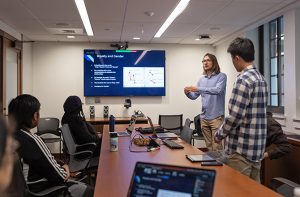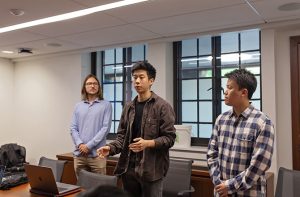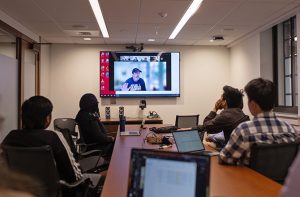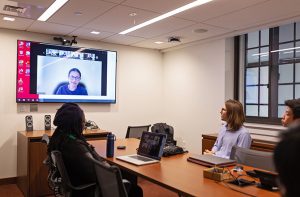
As we prepared to launch our year-end fundraising campaign in the coming days, we considered what we wanted to share with our supporters about what we’ve been up to since the last time we did this. This year, we couldn’t help but be struck by all the novel and exciting work we did with students and recent graduates from Cornell and beyond. While every year finds us engaging students in many different ways, we found the past twelve months to be exceptional in that regard. So, it made sense to put that work front-and-center in this report. Not only are we extremely proud of the students, their work, and our own staff who support them every step of the way, we hope that focusing on these student projects this year has helped this report capture the breadth and depth of our cross-disciplinary operations through a unique and useful lens.
Law Grad Leverages Engineering Background
As our fundraising campaign was ramping up twelve months ago, we were coming to the end of a rare opportunity–the chance to work with a just-graduated law student who possessed significant technical education and training. Thomas Burton collaborated with LII’s staff technologists to develop and code a proof-of-concept approach for the automated answering of multi-state securities regulation questions using data extraction techniques, Large Language Models (LLMs), and generative AI.
His work not only aided our efforts to ease retrieval of comparative data across the 50 states, it helped streamline future collaborations between engineering students and subject domain experts, including in the legal domain. To that end, Burton’s work identified particular types of questions that are more straightforward to answer using deterministic data extractions suitable for populating our symbolic artificial intelligence models versus questions where the answers involve complex language for which language models and generative AI might prove more tractable.
Burton’s work, for example, paves the way for using automation to create “50-state surveys” for regulations addressing the same topic. Just as exciting, though, were his recommendations on a collaboration structure that can be replicated in the future when projects we plan for our M.Eng and computer science students require significant collaboration with law students or those with knowledge in other fields outside of the technical realm.
M.Eng Student Standout
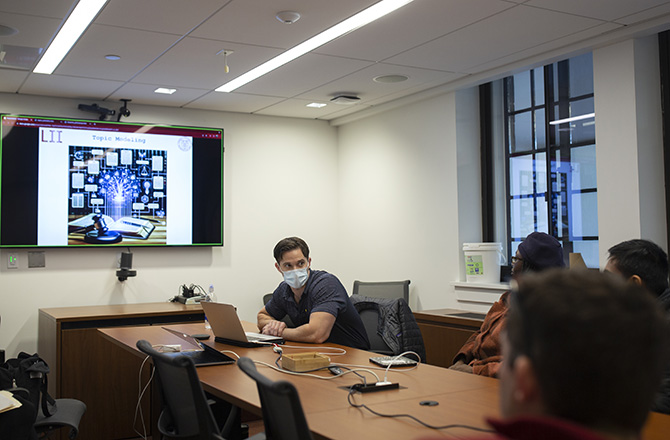
In December, our staff attended the final presentation of Masters of Engineering (M.Eng.) student Adrian Hilton, whom we’d asked to conduct a large number of experiments, resulting in a mapping of state regulations content to an emerging ontology developed by the Standards Advancement for the Legal Industry (SALI) Alliance. The approach he developed can be readily applied to map the content of other LII collections to the SALI ontology.
Adrian’s presentation was a standout, receiving accolades for not only the quality of the engineering work but also the strength of the analogies he drew and his innovative use of AI to create illustrations capturing various legal and technical concepts which often defy visual representation. After graduating the M.Eng. program later that month, Adrian joined LII as a part-time, temporary employee where he mentored the second semester M.Eng student team alongside our own Dr. Sylvia Kwakye, Ph.D. as those students continued his work on AI-assisted SALI ontology mapping.
In a program first, our frequent collaborators at Justia joined us via Zoom from Silicon Valley for the spring semester M.Eng. presentation.
LII’s First Hackathon
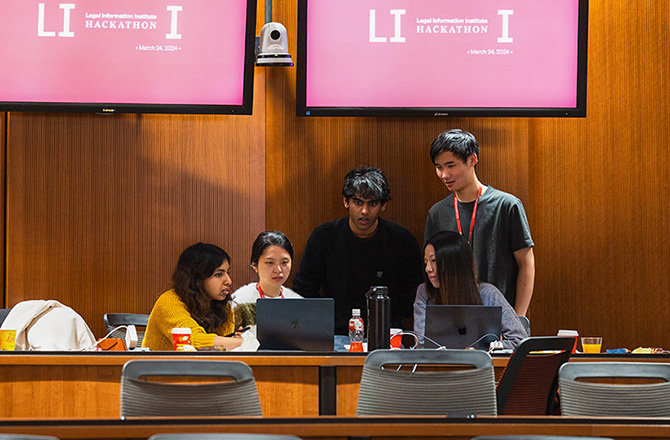
In March, we hosted our first hackathon. Nichole McCarthy, LII’s Original Collections Content Manager, planned and executed the event with support from several LII staff, especially LII’s Director of Engagement Neli Karabelova and Business Manager Valarie Kimber. The hackathon attracted students from various colleges at Cornell, as well as the Syracuse University Library Sciences program. The students formed five interdisciplinary teams to answer the question: How would you organize the content in Wex, our free legal dictionary and encyclopedia?
Before they arrived in Myron Taylor Hall on Sunday morning, the participants had already received a “Welcome Packet” containing a brief history and description of both LII in general and the Wex collection in specific. During the hackathon event, they had just over 6 hours to work together to prepare and propose their answer while receiving mentorship from LII’s staff of technologists and also Edward Cornell Law Librarian and Associate Dean for Library Services Kim Nayyer. All five teams came up with incredibly creative and unique ways to organize the content in Wex and to make the content more accessible to users. While it was difficult for our all-star panel of judges to choose an overall winner–and all teams won a prize–the grand prize ultimately went to Team 5 – “ALIIGN.”
Team ALLIGN consisted of Anurag Koyyada – a JD student from Cornell Law School, Jasmine Li – a Computer Science and Philosophy major from the College of Engineering, and Adler Weber & Christopher Price, both Computer Science majors and from the College of Arts & Sciences. ALLIGN was an initiative to streamline the Wex organization to:
- Reorganize Wex Browse, replacing the traditional alphabetical searching system with a content tag and metadata tag-based tree hierarchy
- Enhance the “Wex Search” capability – replacing our current CMS with a robust, fast ad-hoc vectorized search, and
- Modernize the user interface.
Cornell Creative Services put together a fantastic video of the event, and we hope you’ll take a few minutes to watch it on YouTube.
A Wex Taxonomy Project
Concurrent with the hackathon, Nichole also mentored University of Washington MLIS student Amanda Chin, who explored a new Wex taxonomy as her capstone project. Amanda reviewed not only the Wex collection, but also its history and the available literature on legal taxonomies before compiling a list of recommendations.
The combination of Amanda’s work on the taxonomy and the outcome of the Hackathon leaves us with no shortage of ideas on how to improve the Wex user experience in FY 25.
Wex Work Continued
In addition to those two special Wex projects working on content organization and presentation, Cornell Law students continued to create and revise hundreds of Wex articles. The Wex Definitions Project, specifically, began as a reaction to the contracted labor market for law student summer work during 2020, as most legal employers pulled back from their regular practice of bringing in clerks, interns, and summer associates due to the remote work mandates in place at the time. Since that summer, Cornell Law students have improved upon thousands of definitions originally imported into Wex in an arrangement with a now-defunct third-party online source, replacing them instead with more current and comprehensive, link-dense and example-driven explanations. The project also encourages students to create new definitions where they find a gap in the Wex collection.
The US Supreme Court recently provided a fitting example of the importance and challenge presented in keeping Wex current. On the day the court undermined Chevron deference with its Loper Bright Enterprises ruling, LII assigned a student to update the Chevron deference Wex entry. That week, it was the most popular single page on law.cornell.edu and was viewed more than 50,000 times.
Supreme Court Previews
No description of our work with students would be complete with a mention of the 36 Cornell Law students who comprise our Supreme Court Bulletin Previews staff. Led by Editor-in-Chief Alison Draikiwicz and Executive Editor Moataz Abderlrasoul, our students once again previewed every case argued before the US Supreme Court, a service we have provided to the public without cost for the past two decades. Unlike most years, however, all of the most-viewed Previews came from the current term. Unsurprisingly, important cases regarding judicial deference to federal agency rulemaking, laws imposing limits on speech, and cases involving former President Trump were the most popular among visitors to the website.
Looking ahead to the upcoming term, we hope to work with our Bulletin Previews students to experiment with AI as a means of expanding the project beyond just the cases argued before the US Supreme Court. New Editor-in-Chief Anna Temchenko is eager to explore this initiative alongside LII staff.



